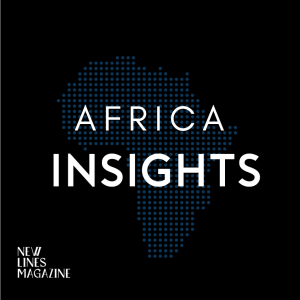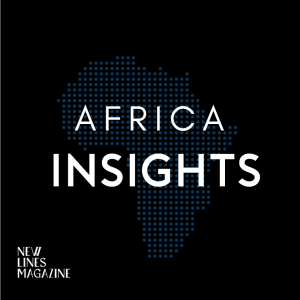Episodes

Friday Mar 22, 2024
Friday Mar 22, 2024
“War changes you. It doesn’t necessarily make you a tougher person or a better person or a worse person, but it is a training on the art of dying,” Joumana Haddad tells New Lines’ Faisal Al Yafai. “I’ve always thought about that ever since I can remember. And it’s not easy to live while thinking you can die any minute.”
The author and activist explains how growing up during the Lebanese Civil War fundamentally shaped her character, encouraging her to try to change the world around her, even if that might just be in her immediate circle.
Haddad and Al Yafai discuss why she chooses to remain in Lebanon despite physical threats to her safety and a tempestuous political climate, most recently manifested in the war in Gaza that has turned southern Lebanon into a warzone. They also discuss some of the ideas that have put Haddad in the firing line in Lebanon, such as her insistence that wearing of the veil or burqa should be banned.
Produced by Finbar Anderson
For more information go to newlinesmag.com/podcast

Friday Mar 15, 2024
Friday Mar 15, 2024
After the attacks in Israel on Oct. 7 last year that sparked the current war in Gaza, Laliv Melamed watched as Israeli society came together to mourn its victims — and also closed itself off. It was a phenomenon she recognized from previous conflicts.
“The entire public sphere becomes like a collective body that is orchestrating around this war effort. I remember in later wars, or operations in Gaza, when I went out to demonstrate, people were shocked that I’m demonstrating in a time of war, because when war is happening everyone needs to be on the same front and just support the troops,” she tells New Lines’ Lisa Goldman.
In her book “Sovereign Intimacy: Private Media and the Traces of Colonial Violence,” Melamed charts the history of what she calls Israeli amnesia back to the 1982 war with Lebanon. She considers how both the country’s media and its anti-war movement present a “partial image of violence,” with profound implications for Israeli society and for those on the other side of the wars it prosecutes, whether in Lebanon or Gaza.
Produced by Finbar Anderson
For more information go to newlinesmag.com/podcast

Friday Mar 08, 2024
Friday Mar 08, 2024
In September 2022, the “Woman, Life, Freedom” movement broke out in Iran after the death of Mahsa Amini in police custody. On this week’s episode Arash Azizi, the author of a new book on the movement, “What Iranians Want: Women, Life, Freedom,” and New Lines’ Danny Postel discuss its immense popularity, how it was different to other protest movements in Iran and why it ultimately failed. Azizi and Postel also consider how the current war in Gaza has shaped the Islamic Republic of Iran’s regional standing.
For more information go to newlinesmag.com/podcast

Friday Mar 01, 2024
Friday Mar 01, 2024
One hundred years ago this week, the Ottoman Caliphate was formally abolished by a decree of the nascent Republic of Turkey’s National Assembly. In this week’s episode of The Lede, New Lines’ Faisal Al Yafai talks to Professor Ryan Gingeras of the Naval Postgraduate School in California, whose book “The Last Days of the Ottoman Empire” tells the story of the caliphate’s final years.
Further listening:The Last Days of the Ottomans — With Eugene RoganImperial Folly After the Ottomans — With James BarrThe Rise of the House of Osman — With Marc David Baer
For more information go to newlinesmag.com/podcast

Tuesday Feb 27, 2024
Tuesday Feb 27, 2024
The recent decision by South Africa, a longtime ally of Palestine, to take Israel to the International Court of Justice (ICJ) on accusations of genocide sent shock waves through the global community.
The unprecedented move served as a wake-up call to Israel’s Western allies, who might not have predicted the drive of a seemingly less powerful nation to take such an action on the world stage.
“The U.S. is not used to having international court judicial proceedings used either against it or against any of its allies,” Stephen Chan, author and professor of world politics at SOAS, University of London tells New Lines’ Kwangu Liwewe. “The whole idea of international tribunals, international courts, international commissions seems very alien to the American sense of how international relations should work. So, in other words, the only actors should be states, preferably powerful states.”
Following South Africa’s case at the ICJ, U.S. lawmakers John James and Jared Moskowitz introduced a bill on Feb. 6 that seeks to reevaluate the bilateral relationship between the U.S and South Africa. The bill alleges that South Africa has forged alliances with malign actors such as Hamas and Russia and specifically accuses South Africa of pursuing a politically motivated lawsuit against Israel.
The legislation stipulates that within 30 days of its enactment, provided it is approved by both the House and Senate, the president must submit to Congress and publicly disclose “an unclassified assessment clearly stating whether South Africa has undertaken actions that undermine the national security or foreign policy interests of the United States.”
The South African government has dismissed the bill stating that it has no future.
South Africa’s response to the Russia-Ukraine conflict has also made some doubt its assertion of being nonaligned. Western diplomats and local experts point to a series of actions that they say contradict this claim and raise questions about South Africa’s foreign policy and its national interests.
These actions include abstaining from U.N. resolutions condemning Russia, engaging in a joint military exercise with the Russian navy, publicly criticizing the U.S. and allegedly aiding a sanctioned Russian cargo ship.
“It is a confused foreign policy,” Phumlani Majozi, a South African author and political analyst says. “We are taking a direction that is breaking our relations with the West.”

Friday Feb 23, 2024
Friday Feb 23, 2024
“There’s more to eyeliner than meets the eye,” Zahra Hankir, author of “Eyeliner: A Cultural History,” tells New Lines’ Ola Salem. “This is not just a makeup product. It carries within it so much meaning that goes far beyond beauty. … Historically and through the centuries, eyeliner has been used as a form of conveying a person’s spirituality or their religiosity. It can be a way to repel the evil eye. It has been used medicinally to treat the eye of various ailments such as conjunctivitis. It’s been used to protect against the glare of the sun.”
Hankir and Salem consider their personal experiences and how the product offered them each a way to connect with their cultural heritage while growing up in the diaspora. “It really was a part of my journey of coming of age and self-acceptance,” says Hankir. “When you are growing up in a predominantly white society, and you’re sort of trying to fit in, just growing up by itself is difficult. … There’s this fine line between wanting to assimilate but also wanting to express yourself and your heritage.”
Hankir recalls that while researching her book she considered an aspect of the Orientalism discourse to which she had not previously given much thought. The bust of the ancient Egyptian Queen Nefertiti, she says, exposes the double standards that Western beauty ideals impose on women from the Global South. “Simultaneously the attraction is because she’s exotic-looking, but also they’re almost repulsed by the idea that they would be attracted to something exotic.”
“What I was trying to do with this chapter on Nefertiti was to understand what her place was in Western society, to situate her within the growth trajectory of eyeliner,” Hankir adds. “To learn about the history of how she was perceived I had to look at primarily Western sources and the discourse around her was so Orientalist.”
Hankir highlights some of the modern contradictions around the wearing of eyeliner, such as the case of Iran, where women’s bodies are policed despite the historically religious practice of wearing eyeliner. “Eyeliner is known in its earliest iterations to have been worn by the Prophet Muhammad. So that would make it permissible for Muslim communities to wear eyeliner,” she points out.
One of the more surprising elements of her research, Hankir notes, was how extensively eyeliner is used across different cultures. “This item of makeup has been used historically across these cultures in different ways,” she says. “At the same time, they will have commonalities and similarities. … They’re using eyeliner for similar purposes, and I think the interesting thing is obviously that the eye is so central to our being.”

Friday Feb 16, 2024
Friday Feb 16, 2024
India’s media ecosystem has a long and proud history. It was in Kolkata, after all, that the first newspaper in Asia was published. But journalists and observers inside the country are speaking with increasing alarm about a climate of repression and self-censorship, in which outlets that challenge the official government line expose themselves to sanctions.
“There’s a complete and near total capture of mainstream voices, especially the loudest voices, the most prominent voices,” says Manisha Pande, managing editor at Indian media watchdog Newslaundry and host of TV Newsance, a weekly show that looks at TV news in India. “It is not an exaggeration to say that, when you turn on the television today, it’s very close to what you see in non-democracies like Russia,” she tells New Lines’ Surbhi Gupta.
“In more than 30, I think 34 years now that I’ve been a journalist, I have never felt as acutely a sense of threat as I do today,” says Samar Halarnkar, the founder of the independent Indian news website Article 14.
Pande and Halarnkar discuss the ever-present threat of legal action against journalists and news organizations, often on flimsy grounds.
“It doesn’t really matter what the charges are,” says Halarnkar. “In India, the judicial process is the punishment.”
Pande warns of a trend toward a hyperpartisan media environment in which the dominant, pro-government channels frequently join the government in attacks on the media and echo populist lines denigrating minority groups.
“I think in 2016 there was a marked shift where anchors started asking for the jailing of activists or voices or dissenters that weren’t in line with the current government,” she says.
“What’s happening to the media is an indication of the de-democratic realization,” adds Halarnkar. “Many people are self-radicalized, believing every bit of this fake news,” he says. “That turns them against their neighbors and friends.”
The two journalists discuss the economic incentives behind pushing a pro-government line and the financial difficulties that might be suffered by trying to remain independent.
“If you’re a digital news organization, you want investors coming in,” says Pande. “Today, you’re in that space where even if people believe in you and support you … they may not necessarily want to be seen around you because you’re seen as anti-government.”
Pande still marvels at the fact that Prime Minister Narendra Modhi still refuses to speak directly to journalists at press conferences.
“It’s really pathetic that the largest democracy in the world has accepted this,” she says.

Monday Feb 12, 2024
Monday Feb 12, 2024
When it gained independence from Sudan in 2011, South Sudan emerged as the world’s newest nation. However, two years later the country descended into a civil war sparked by a political difference between President Salva Kiir and Vice President Riek Machar, which escalated into a protracted ethnic conflict. The internal struggle for power ignited political unrest, interethnic tensions and communal violence.
In 2018, international pressure forced the Kiir-led government to declare a cease-fire and endorse a power-sharing deal among rival political factions.
The peace plan, which has largely been ignored by the government and the political elite, subsequently led to ethnic and communal violence in the country.
“The government has been using violence in the peripheries of the country to jockey for power and compete among themselves. So the war is formally over but the violence has continued,” Joshua Craze, a New York-based researcher on South Sudan, tells New Lines’ Kwangu Liwewe. “Every time Juba sends someone seemingly to stop the conflict or negotiate the conflict, they are always partisan.”
But the ongoing violence in most parts of the country does not fit the traditional narrative of rebels vs. the state, as it is largely driven by intercommunal conflicts among ethnic groups. This stems from the shifting dynamics within the South Sudanese state, which no longer revovles solely on competition between Kiir and Machar.
In his recent story, New Lines contributor James Barnett explored how South Sudan remains in a state of uncertainty even though the war ended thirteen years ago.
“The problem has been aggravated . The violence has morphed into what may appear to be local level conflict but very much ties back to the national level politics,” Barnett explained to Liwewe.
In the past two months, a fresh wave of violence has claimed the lives of 136 people. This time it’s in the disputed Abyei region along the border of Sudan and South Sudan. Fighting broke out between the Twic Dinka and Ngok Dinka communities, intensifying tensions in the region.
“It serves Salva Kiir … not to resolve the Abyei fight because that allows him to keep his relationship with Sudan, and it also means a number of Ngok Dinka who are powerful don’t take up a central place in politics,” Craze said.

Friday Feb 09, 2024
Friday Feb 09, 2024
With so many wars across the world, a new one supplants the previous on our TV screens and front pages. As conflicts drag on, the attention of the public moves on too.
When Russia invaded Ukraine two years ago, that war began to dominate the news cycle, displacing coverage of Myanmar, Sudan and Syria. But, as the months wore on, the Ukraine war, too, slipped from our screens. Now the war in Gaza has captured global attention, but for how long?
Why is it that while the human suffering never gets less tragic, we seem to have only a finite amount of empathy for the victims of conflict? And what is the effect on our creeping ambivalence?
For Bel Trew, chief international correspondent at The Independent, this decline in interest has become something she learns to anticipate at the start of every war she covers. “You know, if you’ve covered conflict before, that the world’s focus is fickle,” she tells New Lines’ Faisal Al Yafai. Whether in Gaza, Ukraine, Myanmar or Syria, “There will be a point where those cameras shift, the spotlight shifts. … As a journalist who becomes obviously invested and cares and talks to people, and makes friendships with people when you’re on a front line, you almost feel like it is a betrayal.”
For Trew, the importance of continuing to cover these conflicts lies in showing the full effect of war, despite knowing her audience might be mostly interested in how the conflict might affect them. “The most important thing that we can do is show people just how devastating war is, so that it’s not just turned into what’s essentially a game of armies and the playground of the battlefield. But people want to know how this is going to impact them.”
Nabih Bulos, Middle East bureau chief for the Los Angeles Times, wants his audience to understand that they often have a degree of complicity in a faraway conflict and what that actually means. “I want people to really understand what it means when a politician or a soldier says the phrase surgical strike. I want them to understand what it means when they’re going into a country or establishing a no-fly zone,” he says.
The veteran correspondents note that some conflicts are easier to report on than others, and many change as the conflict progresses. Bulos remembers the battle against the Islamic State group as offering a great deal of freedom for reporters, who could embed with different units in the Iraqi army freely.
But, as Trew notes, that’s not always the case.
“Another issue with forever wars is that access becomes quite difficult,” she says. “You end up telling the same story again and again.”
Furthermore, she notes that as conflicts progress and subsequent events can incur ever higher casualty figures, statistics can become meaningless. “We had the clearing of Rabaa,” she says, remembering the 2013 massacre of protesters by Egyptian police, in which more than 1,000 were estimated killed. “A few weeks later, there were 66 people killed in a protest, which would normally be a very high number of unarmed protesters to be killed,” Trew recalls. “Because we’d already had 1,000 [casualties], people got desensitized.”
As numbers start to lose their meaning, you have to focus on human stories, Bulos suggests. “The enormity of those figures means nothing to people, and the only way to bring it home to people is to focus on the smaller stories,” he says.
Produced by Finbar Anderson

Friday Feb 02, 2024
Friday Feb 02, 2024
Every conflict is different, as Pierre Hazan knows all too well. The veteran negotiator and senior adviser on transitional justice with the Centre for Humanitarian Dialogue has witnessed many wars, including those in the former Yugoslavia and the Central African Republic. And while no two are the same, more often than not they start from the same place.
“Very often you start by what we call ‘Track Two,’” Hazan, author of the recently published book “Negotiating with the Devil: Inside the World of Armed Conflict Mediation,” tells New Lines’ Lydia Wilson. “You try to approach different people that are ready to talk to the other side. It’s a period of testing the different red lines to better understand the dynamics of each side.”
Hazan explains that much of the work of the conflict mediation happens away from the negotiating table.
“Very often it could be dangerous to go too fast and to want to have both sides together. They need to be ready to do that; they need to have elaborated their red lines; they need to have elaborated their strategy. So you spend a lot of time working separately with each group.”
Hazan and Wilson discuss the underlying tension between choosing to pursue peace on the one hand or justice on the other. Hazan recalls meeting a Western ambassador. “He said, ‘It’s so bizarre — I just had a whiskey with Milosevic and some people here want to indict him. How does it work? Do we want to make peace or do we want this man behind bars?’”
Negotiation usually involves a compromise with powerful people who might have committed horrendous acts.
“Sometimes the imperative is to get the war to stop, and people stop getting killed and justice will come later. But you will try at the same time to introduce some elements of justice even during the peace process,” Hazan says. “Human rights documentations and other things could be important because also it gives hope to the victims, to the society at large. They can imagine a process of reconstruction.”
Hazan and Wilson debate the nature of the International Court of Justice’s recent findings in the case of South Africa’s case against Israel for a potential breach of the Genocide Convention. But Hazan notes the case’s effect on the multiple tracks of negotiation currently taking place in the context of the Gaza conflict.
Wilson challenges Hazan on his contention that it is always necessary to take the immediate option to save lives, as she argues that in the case of Syria such a choice might have led to a greater death toll in the conflict in that country. Hazan, however, notes the example of the 1995 massacre in Srebrenica of Bosniak Muslims, which he argues could have been averted.
“When you are confronted with excruciating dilemmas, you are trying to identify the lesser evil,” Hazan says. “It’s not a perfect solution. It’s not even a good solution, but it’s possibly a lesser evil.”
Produced by Finbar Anderson





